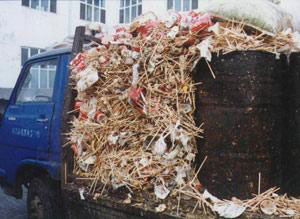
 |
|
 |
|
Related Links |
|
|
- Maui county considers proposed plastic bag ban
The proposal would require businesses with annual gross sales over $250,000 to provide compostable plastic bags, paper bags or reusable bags to customers. Proponents say standard plastic shopping bags cause litter and threaten marine life.
|
|
 |
|
 |
A Chinese blog claims that 45 billion pairs of disposable chopsticks are tossed out yearly in China, contributing to deforestation and mounds of unnecessary waste.
In a bid to scale back garbage in Japan, consumers in the country will be encouraged to bring their own chopsticks and carry reusable shopping bags.
The cabinet on Tuesday approved a recycling plan that aims to reduce annual waste to 25.3 million tons — or 40 per cent of the amount of garbage produced in 2000. The cabinet set a deadline of 2015 to achieve the goal.
"We are still lacking efforts. We have not been able to break away from the mass consumption society," said Tsuyoshi Kawakami, a spokesman for the Environment Ministry.
The plan, which stopped short of issuing an outright ban on plastic bags, will also promote more eco-friendly modes of transport, including bicycles and the public transportation system.
Plastic bags have virtually taken over the grocery market since they were first put at check-out stands in 1977, and ninety percent of all grocery bags are now plastic, according to the Progressive Bag Alliance.
Estimates of the number of plastic bags used around the world each year range from 100 billion to as many as one trillion
Japan is just one of many places to announce plans to scale back consumer waste. In March 2007, San Francisco became the first North American city to ban non-recyclable plastic bags made from petroleum products.
In April 2007, the Manitoba town of Leaf Rapids became the first Canadian municiplity to prohibit plastic sacks. Other regions in South Africa, Ireland and Taiwan have placed additional fees and taxes on the bags to discourage use.
Plastic bags made of polyethylene dominate the market, are non-biodegradable and made from crude oil and natural gas, both nonrenewable resources.
Several counties in Hawaii have considered bans on single use plastic bags.
"It's an opportunity for Hawai'i to show the world the way that we should be treating disposable plastics," said Miwa Tamanaha, executive director of the Hawaiian-environmental alliance Kahea, noting that a lot of plastics generated outside of Hawai'i wind up here via Pacific currents. "The plastic that we generate now is going to be with us possibly forever (and) at least into the foreseeable future. Once we create it, we're stuck with it."
Although plastic bags theortically can be recycled, but only 5% actually are and they can take 1,000 years to decompose, according to EPA.
|


















